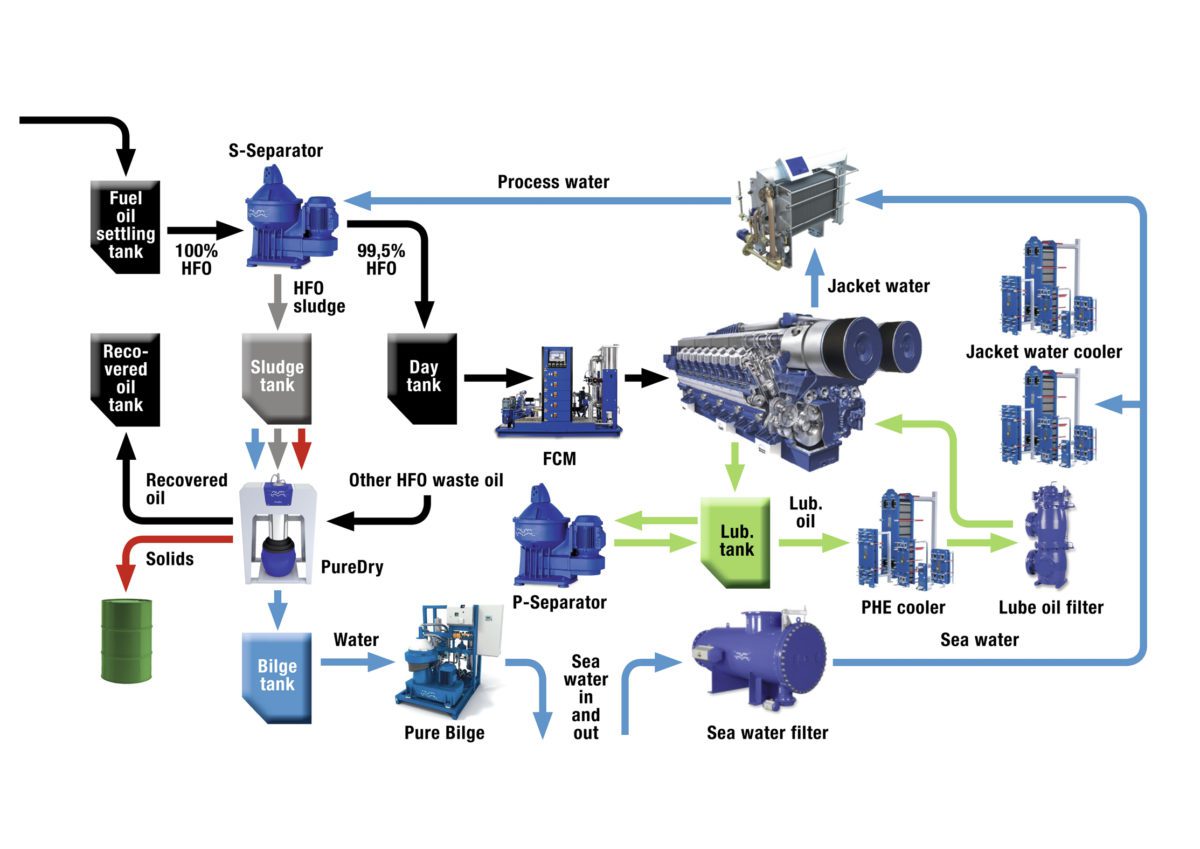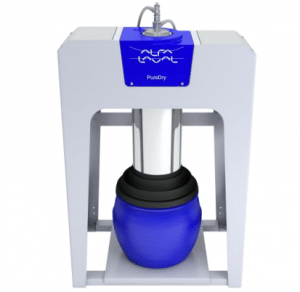Indian Seafarers Freed After Months of Detention at Yemen’s Ras Isa Port
India says it has secured the release of more than 150 seafarers who were stranded at Yemen’s Ras Isa Port, according to the Directorate General of Shipping. All 11 vessels...

Onboard ships throughout the world, highly specialized engineering systems such as fuel oil purifiers, waste heat boilers, and emissions scrubbers save energy, reduce CO2 emissions and prolong engine lifetimes. Amongst shipboard engineers, the Swedish brand Alfa Laval, is quite familiar and one that is closely associated with such systems.
At this year’s SMM Hamburg conference, representatives from Alfa Laval discussed the movement toward saving fuel, reducing ship emissions, and the steps they are taking toward achieving these important goals.
Fuel trend drivers
With increasingly stringent local and global environmental regulations, ship owners and operators are currently reviewing their future options in terms of fuel compliance strategies and new fuels are being discussed. The result is likely to be the use of lower and more variable fuel quality, with more cat fines. Thus, there will be an even sharper focus on fuel handling and cleaning efficiency, and advanced fuel treatment equipment will become even more important.
A main driver is, of course, the need to reduce ship operation costs in order to remain profitable and competitive. Here the focus is on fuel efficiency, fuel flexibility, equipment life-cycle costs and cost of ownership.
Equally important is to find solutions that will comply with new legislation. The focus in this case is on preparing fuel systems for handling multiple fuel types onboard. Other factors are fuel availability, deteriorating fuel quality, reliability and safety.
Future options
Of the main future options for ship owners and operators, Alfa Laval believes that the three most likely to dominate in the short term are: continue with HFO and add exhaust gas cleaning equipment (scrubbers); continue with HFO and complement with distillates (dual fuel); or blending fuel in order to meet environmental legislation.
Another option is to switch to LNG. However, for many industry players this is not a feasible option for the near future due to its prohibitive investment cost, lack of availability in terms of distribution infrastructure and the uncertainty of the future price of LNG bunkers.
Handling the short-term options
With the technologies, products and application know-how to handle the new fuel situation, Alfa Laval is currently focusing on multiple fuel management, blending fuels, and exhaust gas scrubbing – the company recently launched the PureSOx system for the latter application. These options, along with increased demands on logging, to provide proof of compliance when switching over, all contribute to making the Alfa Laval fuel treatment line more fit for the future.

A lot in the pipeline
In line with this thinking, the company is focusing its efforts on optimizing the complete fuel treatment line from an installation and operation point of view, while continuing to develop products that reduce emissions and oil losses, offer lower energy consumption and generate less waste.
An example of Alfa Laval’s innovative thinking is the new PureDry centrifugal separator, which has the capability to recover re-usable fuel oil from waste oil. Also in the pipeline are booster systems with fuel blending capabilities, advanced logging systems, and much more.
Waste heat recovery – a unique opportunity
Today’s modern ship propulsion systems are considerably more efficient than their predecessors. Yet half of the energy they produce still goes to heat rather than propulsion.
By recapturing this energy and putting it to use, Alfa Laval reduces both fuel consumption and emissions. The recovery of waste heat is a unique opportunity that benefits operating economy as much as the environment.
Developed in cooperation with main engine suppliers and turbine manufacturers, Alfa Laval Aalborg waste heat recovery systems take the excess energy from the main engine exhaust gas and convert it into electric power by means of a steam turbine and a generator. Alfa Laval’s latest waste heat recovery boiler, the Aalborg XW-TG, is a critical component in the process. The waste heat is recovered in the boiler by producing the maximum amount of steam from the energy in the exhaust gas.
Annual savings of MUSD 2.4 for a container ship
The wasted energy in the exhaust gas from the propulsion systems on the average container vessel amounts to approximately 50% of the energy from the burned fuel oil. With the waste heat recovery system it is possible to improve the efficiency by 10-12%. Recovering a percentage of the wasted energy reduces the vessel’s fuel consumption and emissions and allows greater flexibility in terms of engine configuration.
On a typical container vessel a waste heat recovery system can produce up to 3 MW of electric power. This corresponds to annual savings of 4,000 tonnes of fuel and about 12,000 tonnes of CO2, with a cost reduction for the operator of USD 2.4 million. Since the capital investment is approximately USD 4.2 million, payback time is fairly short and will decrease as fuel oil costs rise.
Waste heat recovery after the auxiliary engines
On container vessels, the traditional boiler installation comprises an oil-fired boiler, an exhaust gas economizer producing steam when the vessel is at sea, and auxiliary engines generating electricity for the reefer containers, and other purposes onboard the vessel.
In the past, it has not been considered worthwhile to recover the energy in the exhaust gas from these engines. However, the rising cost of fuel oil has opened ship operators’ eyes to smaller savings.
Steam for in-port requirements
Alfa Laval has now introduced a new waste heat boiler, the Aalborg XS-TC7A economizer, which is specially designed forinstallation after the auxiliary engine. Compact and easy to install and retrofit, it delivers sufficient steam for in-port requirements and in some cases at sea. The unit benefits the ship owner and the atmosphere by reducing the need to burn fuel oil in the oil-fired boiler when in harbour.
A waste heat recovery system on a container vessel with 3 MW gensets installed will provide annual fuel oil savings of approximately 100 tonnes, a reduction in CO2 emissions of about 300 tonnes, and annual cost savings for the operator when operating on HFO of about USD 60,000.
The numbers are smaller but with thousands of vessels trading and around 1,500 new vessels being delivered each year, even small savings will make a difference.
Identifying overlooked heat sources
Alfa Laval is now focusing on overall system efficiency and will continue to identify other sources of wasted heat. Using overlooked heat sources to superheat steam, for example, not only helps vessels accommodate their power generation needs, but also helps prepare them for forthcoming emission regulations. Since they cut fuel consumption and thereby costs, they also limit their production of CO2, NOX, SOX and other emissions.
TCi boiler range
Alfa Laval has a market share in excess of 30% with its energy product portfolio and, in addition to developing new products, it continuously improves its existing, oil-fired Aalborg boiler range. Aalborg TCi (Turbo Clean, intelligent) technology offers improved efficiency and self cleaning effects without water washing.
TCi boilers offer highest quality and reliability with lowest life-cycle costs. They also have a higher output-to-weight ratio than competing products and are therefore lighter and occupy less space, thus increasing the ship’s cargo carrying capacity.
Learn more about these products and Alfa Laval’s unique approach to marine solutions at www.alfalaval.com/marine.

Sign up for gCaptain’s newsletter and never miss an update

Subscribe to gCaptain Daily and stay informed with the latest global maritime and offshore news


Stay informed with the latest maritime and offshore news, delivered daily straight to your inbox
Essential news coupled with the finest maritime content sourced from across the globe.
Sign Up